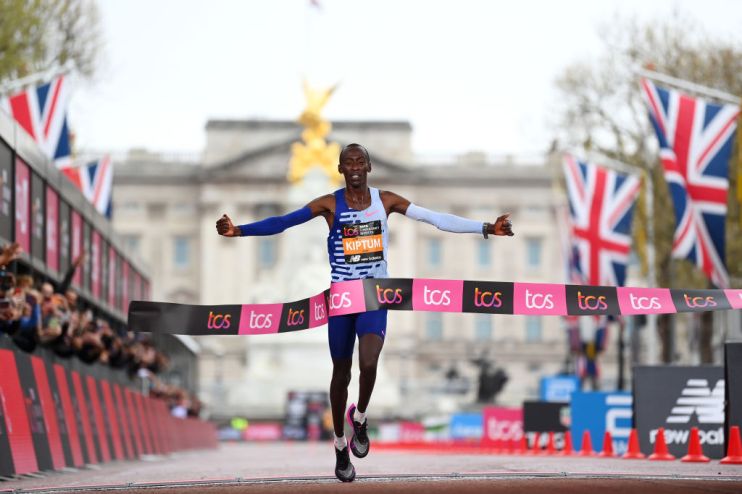Ed Warner: Why the London Marathon is a world leader – and a bargain

Our sport business columnist examines the enduring popularity of the London Marathon – and why organisers could be making more money from the event.
Spring has sprung and marathon season is in full swing. From the likes of Paris, Bratislava and Brighton last weekend through to the doyenne that is Boston at April’s end. Via, of course, the centrepiece in London, rivalled for glamour only by New York which sits on the opposite side of the calendar.
The Big Apple beat London to a mass marathon by 11 years, being first run in 1970, but Britain’s capital gave the event its set 26.2 mile distance at the 1908 Olympics. While weary runners may curse Pheidippides for his epic journey after the Battle of Marathon in 490 BC, it is Queen Alexandra’s request to move the start line at Windsor Castle that deserves most opprobrium for those struggling up Birdcage Walk or in the final 385 yards of any marathon worldwide.
The Greek messenger collapsed and died after delivering his news of victory over the Persians. No energy gels and super shoes back in his day.
London’s rise to spring pre-eminence is testament to a small but slick operation that early on worked out how to navigate the complexities of London borough bureaucracy while selling the vision of a marriage of elite athletic endeavour to Joe and Joanna Public’s testing of their personal endurance. Key has been a deep knowledge of the sport within the race’s founders through to its leaders today.
The nearer you live to London, the more likely you are to know someone running the 26.2 miles on 21 April. More likely than not they will be doing so for charity. The London Marathon itself is a canny corporate structure – a professional events company owned by a charity. The latter enjoys the profits from the race, distributing them to capital projects promoting physical activity in the capital and other areas which host the company’s events.
Could the London Marathon be more profitable? Sure it could. An entry fee of £69.99 for domestic entrants is notably the lowest of the six World Marathon Majors and less than a third of New York’s.
This charitable architecture, coupled with runners’ direct fundraising efforts, adds to London’s aura. Would there be up to 1m people watching on the streets otherwise? I doubt it. They are unlikely, after all, to see a men’s world record broken. That’s only happened once, back in 2005. Berlin, a flatter course with wider, smoother bends, has witnessed nine. Anyway, at roadside the elite athletes flash by you in seconds whereas the masses provide hours of emotional engagement.
The public ballot to enter the 2025 London Marathon opens on the day of this year’s race. As ever it will be massively oversubscribed. I adhere to the oft-repeated claim that after a first marathon everyone says “never again” but within minutes or hours a small sub-set will think “maybe one more”.
Truth is, for the vast majority this is “one and done”. And if you’re only ever going to go this distance once, why not in the most iconic race? This helps explain why the London Marathon is bucking a downwards trend in participation in running events. Although there was a spike in recreational running in the pandemic, ParkRun and organised races are still operating at below pre-Covid levels.
One sign of the times was the Brighton Marathon going into administration in 2022. The race has been a classic alternative for those who fail to secure a London place since 2010. It is now operated by London Marathon Events. Other British marathons have fallen by the wayside. Road closures are costly and complex to agree with the authorities. The economics only tend to work for small events (off-road, especially) or mega races. The middle ground is a hand-to-mouth existence.
So, all roads continue to point to The Mall. If you do know anyone running London next weekend, do slip them a few pounds for charity. It might just give them the motivation they need while cursing Queen Alexandra in those final few yards.

In my experience, your favourite marathon is your last completed, unless you made a complete hash of it. So, Reykjavik for me. Until London in 10 days time – hash-avoidance permitting, that is. I confess though to an enduring love of Boston’s race which comes with 127 years of history, only one of which was fallow. Covid did what two World Wars and the 2013 bombers couldn’t.
Marathon weekend in Boston drips with its stories, and appeals to running nuts who all – barring a small number of charity places – have to prove they’ve met a qualifying standard to enter the race. I made a hash of it last time I ran it though…
Monsieur Motivator
A running mate who ran the Paris Marathon last weekend was surprised to find his target race time printed on his bib instead of a more normal way of identifying the pen he had to line up in at the start.
How’s that for publicly shaming anyone who then falls short of their pre-race ambition? Or maybe it was a Gallic motivational tactic for all the runners.
Pleased to say he was comfortably inside his 3:30 target for his first marathon; 3:18.34 to be precise. Four days on and he’s in the “maybe one more” camp.
Welcome to the Pleasuredome
Hard to know what to make of the government’s announcement of a five-year programme to build 16 cricket domes and invest £14m in three cricketing charities. Total cost: £35m. Objective: to get over 900,000 more kids playing the sport, with an emphasis on the most disadvantaged.
“One last sporting punt from a ‘cricket-loving’ PM?” a sporting insider asks me. It’s certainly come out of the blue – unusual for a leaky political world prone to multiple pre-announcements.
As with all such things, we will never know whether the money proves well spent, but I hope it’s not too late to ensure that the domes have multi-sport capability as cricket isn’t the only leisure pursuit crying out for new indoor capacity and support for work in neglected corners of the kingdom.
Clip, clop, snip, chop
It hasn’t taken long for the smaller crowds at the Cheltenham Festival to bite. The Jockey Club, Cheltenham’s owner, has sliced prize money at its other racecourses and downgraded the status of five meetings. Read the details here in the Racing Post. The Jockey Club’s CEO cites “very, very significant financial headwinds”. Hard to see these abating anytime soon.
It’s coming home
Looping this column back to London, we’ve just launched the search for members of the board that will oversee delivery of the World Team Table Tennis Championships at the OVO Arena in Wembley in 2026.
This is going to be a sensational 10 days of sport. If you think you’ve the passion to help make the Champs a success and would like to join me on the board to do just that, then take a look at the details here.
We’re seeking a wide range of skills to help ensure this is a ground-breaking event. It’s going to be fun – guaranteed!
Ed Warner is chair of GB Wheelchair Rugby and writes his sport column at sportinc.substack.com
